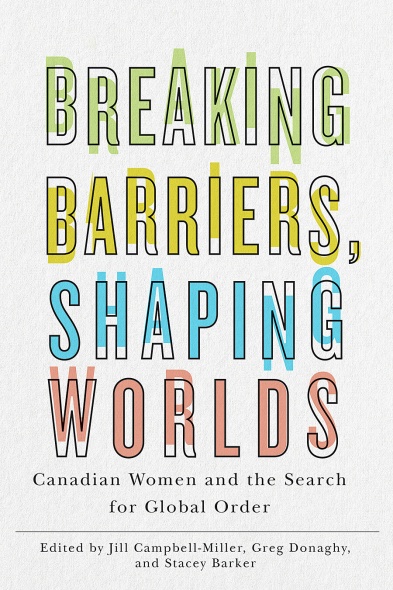The histories of humanitarian aid and diplomacy are closely entwined. In honour of International Women’s Day 2022, historian and CNHH member Jill Campbell-Miller reflects on the importance of expanding our understandings of diplomacy to include the women whose often unsung contributions have shaped the global order alongside men’s better known diplomatic exploits.
by Jill Campbell-Miller
8 March 2022
If one were to choose a single picture that encapsulates our collective understanding of twentieth-century diplomatic history, a few options easily spring to mind. Perhaps Churchill, Roosevelt, and Stalin at the Yalta conference of 1945 – or the photo of Woodrow Wilson, David Lloyd George, and Georges Clemenceau that graces the cover of Margaret MacMillan’s Paris 1919. Both photos tell stories of larger-than-life men leading their countries through war and toward peace. These images also carry other notions about diplomacy, such as oak tables surrounded by men smoking tobacco, hammering out the world’s business in an exercise of intellect over force. They arrive in our minds imbued with masculinity, informed by what historians and the media have taught us to see as diplomacy.
Women are largely absent from these famous images and are certainly absent from our shared imagination around what constitutes “diplomacy” in the twentieth-century context. In recent years, however, historians have begun to broaden their outlook on diplomatic history. Indeed, in Canada, the trend has been a shift from a narrower focus on the North Atlantic Triangle and the oak tables of previous iterations of diplomatic history (necessary though that work has been) toward a more expansive version of international history that is willing to look beyond the conference room as the site of diplomacy. This change has allowed women to move to the forefront as historical actors on the international stage.
The new collection Breaking Barriers, Shaping Worlds: Canadian Women and the Search for Global Order, which I co-edited with Greg Donaghy and Stacey Barker, brings together nine chapters that profile the work of Canadian women abroad. Organized around three themes – women in missions, aid, and development; women in international resistance; and women in diplomacy – it examines the work of activists, missionaries, diplomatic spouses, and diplomats. In doing so, it emphasizes one important, overlooked, truth: while these women’s work may have been rendered invisible or simply been undervalued by the societies in which they lived, women were present, and they made an impact.

Take, for example, Kim Girouard’s chapter on Dr. Jessie MacBean, a Canadian missionary who worked for decades in South China educating women and men in obstetric specialities. As a missionary, MacBean participated in a network of imperialism, with all the problematic and sometimes destructive qualities that this entailed. Yet her work developing clinics and medical education in South China not only provided quality health care, it helped to train the next generation of Chinese obstetric specialists, including women. Girouard draws our attention to this forgotten story and legacy.
Even when it has not been forgotten, women’s work has sometimes been undermined by gendered stereotyping. Jean Casselman Wadds is well remembered as the high commissioner to the United Kingdom who helped to guide the patriation of the Canadian constitution. But as Steve Marti and Francine McKenzie write in their chapter on Casselman, the tense negotiations that led up to the final agreement have been characterized as a “dinner party war,” thereby undermining the serious diplomatic skills it took to hold many contradictory opinions around the same table. The dining hall of Canada’s high commission in London served as the trench network in this war and Casselman Wadds was not only adept at the domestic art of holding a dinner party, she was also a savvy politician. It was her expertise in both domains that smoothed the way for the patriation. Although traditionally feminine attributes are frequently characterized as weak or silly, they bring an emotional intellect often necessary for tense diplomatic situations.
These chapters and others in Breaking Barriers, Shaping Worlds demonstrate the importance of finding women in the historical record, some of whom may be hiding in plain sight. By omitting women’s history – as well as the histories of Indigenous, Black, LGBTQ2S+, and other marginalized groups – we miss out on a fuller understanding of historical events, even those we think we understand well. That is why events like International Women’s Day serve as important reminders. As historians, we do not seek to make or glorify heroes, but we do want to know what happened. Without understanding women’s roles in history, we will only ever have an incomplete picture of a rich and complex past.
To purchase Jill Campbell-Miller, Greg Donaghy, and Stacey Barker, eds., Breaking Barriers, Shaping Worlds: Canadian Women and the Search for Global Order (UBC Press, 2021), visit: https://www.ubcpress.ca/breaking-barriers-shaping-worlds
Dr. Jill Campbell-Miller is a historian who specializes in twentieth-century Canadian foreign policy and international history, with a focus on the history of foreign aid, international development, natural resources, humanitarianism (especially health education), women and gender. Her PhD dissertation, which she is currently revising to become a manuscript, examined the history of Canadian foreign aid in India during the 1950s. She recently completed an AMS postdoctoral fellowship at the Gorsebrook Research Institute at Saint Mary’s University, and a SSHRC doctoral fellowship in the Department of History at Carleton University.



